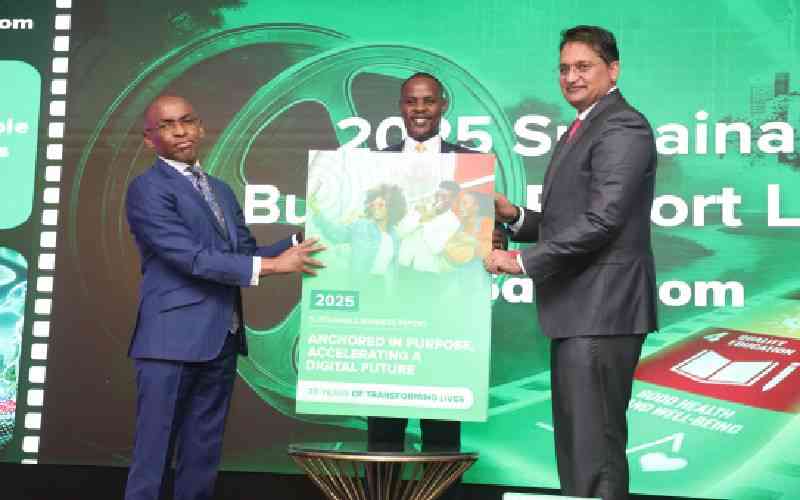The report underscores Safaricom’s evolution into a purpose-led technology company, emphasising its goal to lead Africa’s digital transformation by 2030.
Speaking at the report’s launch in Nairobi on Tuesday, Chief Executive Peter Ndegwa highlighted how sustainability drives commercial success.
“From 17,000 subscribers in 2000 to over 60 million customers across Kenya and Ethiopia, our growth has been fueled by innovation and collaboration,” he said.
“By embedding ESG (Environmental, Social, and Governance) principles into every layer of our business, we’ve built a socially conscious, environmentally responsible, and inclusive model.”
Follow The Standard
channel
on WhatsApp
Ndegwa emphasised inclusivity as central to Safaricom’s mission, citing initiatives like the Daktari Smart telemedicine program, M-Pesa Foundation, and partnerships with the Communications Authority of Kenya.
These efforts have expanded access to health services, education, and digital connectivity in remote areas, directly impacting over eight million Kenyans.
Board Chairman Adil Khawaja praised the management for executing Vision 2025, Safaricom’s first purpose-led strategy, which prioritises sustainability and inclusion.
“We’ve aligned growth with digital inclusion and shared prosperity. ESG is not a side agenda—it’s a core business driver,” Khawaja said.
He noted a 48.6 per cent group revenue increase over five years and a Sh30 billion sustainability-linked loan to advance equality, diversity, and the company’s net-zero emissions goal by 2050.
Kenya’s Special Envoy on Technology, Ambassador Philip Thigo, urged African leaders to embrace a mindset for the “intelligent age,” using data-driven innovation to bridge digital inequality.
Despite Kenya’s 68.8 million mobile connections, only 27 million citizens have internet access—a gap reflecting broader global disparities.
Thigo projected Kenya’s digital economy to contribute nearly 10 per cent of GDP by 2025, with Africa’s green economy potentially creating 3.3 million jobs by 2030. “Technology must empower, not just connect. Inclusion is key to building Africa’s digital economy,” he said.
Principal Secretary for Environment and Climate Change, Dr Festus Ng’eno, commended Safaricom’s alignment with national environmental and social priorities.
He highlighted the company’s contribution to the National Tree Growing Programme, planting over 830,000 trees and restoring 694 hectares of degraded forests across eight counties.
The Jaza Miti app, developed by Safaricom, was praised as a model for democratising environmental action through technology.
Dr Ng’eno noted that these efforts align with Kenya’s National Climate Change Action Plan, Vision 2030, and the National Energy Policy (2025–2034), emphasising public-private partnerships as key to sustainable growth. “Safaricom shows that sustainability and profitability can coexist,” he said.
The 2025 Sustainable Business Report outlines Safaricom’s commitment to climate action, digital inclusion, circular economy initiatives, and ethical governance.
The company aims to achieve net-zero emissions by 2050 while fostering economic opportunities through recycling, digital skills, and inclusive financing.
Looking ahead, Ndegwa reaffirmed Safaricom’s focus on transforming lives. “Our next chapter will be defined by purpose, inclusivity, and innovation, connecting people to opportunities and information,” he said.
Follow The Standard
channel
on WhatsApp
The report underscores Safaricom’s evolution into a purpose-led technology company, emphasising its goal to lead Africa’s digital transformation by 2030.
Speaking at the
report’s launch in Nairobi on Tuesday, Chief Executive Peter Ndegwa highlighted how sustainability drives commercial success.
“From 17,000 subscribers in 2000 to over 60 million customers across Kenya and Ethiopia, our growth has been fueled by innovation and collaboration,” he said.
“By embedding ESG (Environmental, Social, and Governance) principles into every layer of our business, we’ve built a socially conscious, environmentally responsible, and inclusive model.”
Follow The Standard
channel
on WhatsApp
Ndegwa emphasised inclusivity as central to Safaricom’s mission, citing initiatives like the Daktari Smart telemedicine program, M-Pesa Foundation, and partnerships with the Communications Authority of Kenya.
These efforts have expanded access to health services, education, and digital connectivity in remote areas, directly impacting over eight million Kenyans.
Board Chairman Adil Khawaja praised the management for executing Vision 2025, Safaricom’s first purpose-led strategy, which prioritises sustainability and inclusion.
“We’ve aligned growth with digital inclusion and shared prosperity. ESG is not a side agenda—it’s a core business driver,” Khawaja said.
He noted a 48.6 per cent group revenue increase over five years and a Sh30 billion sustainability-linked loan to advance equality, diversity, and the company’s net-zero emissions goal by 2050.
Kenya’s Special Envoy on Technology, Ambassador Philip Thigo, urged African leaders to embrace a mindset for the “intelligent age,” using data-driven innovation to bridge digital inequality.
Despite Kenya’s 68.8 million mobile connections, only 27 million citizens have internet access—a gap reflecting broader global disparities.
Thigo projected
Kenya’s digital economy to contribute nearly 10 per cent of GDP by 2025, with Africa’s green economy potentially creating 3.3 million jobs by 2030. “Technology must empower, not just connect. Inclusion is key to building Africa’s digital economy,” he said.
Principal Secretary for Environment and Climate Change, Dr Festus Ng’eno, commended Safaricom’s alignment with national environmental and social priorities.
He highlighted the company’s contribution to the National Tree Growing Programme, planting over 830,000 trees and restoring 694 hectares of degraded forests across eight counties.
The Jaza Miti app, developed by Safaricom, was praised as a model for democratising environmental action through technology.
Stay informed. Subscribe to our newsletter
Dr Ng’eno noted that these efforts align with Kenya’s National Climate Change Action Plan, Vision 2030, and the National Energy Policy (2025–2034), emphasising public-private partnerships as key to sustainable growth. “Safaricom shows that sustainability and profitability can coexist,” he said.
The 2025 Sustainable Business Report outlines Safaricom’s commitment to climate action, digital inclusion, circular economy initiatives, and ethical governance.
The company aims to achieve net-zero emissions by 2050 while fostering economic opportunities through recycling, digital skills, and inclusive financing.
Looking ahead, Ndegwa reaffirmed Safaricom’s focus on transforming lives. “Our next chapter will be defined by purpose, inclusivity, and innovation, connecting people to opportunities and information,” he said.
Follow The Standard
channel
on WhatsApp
By Sofia Ali
